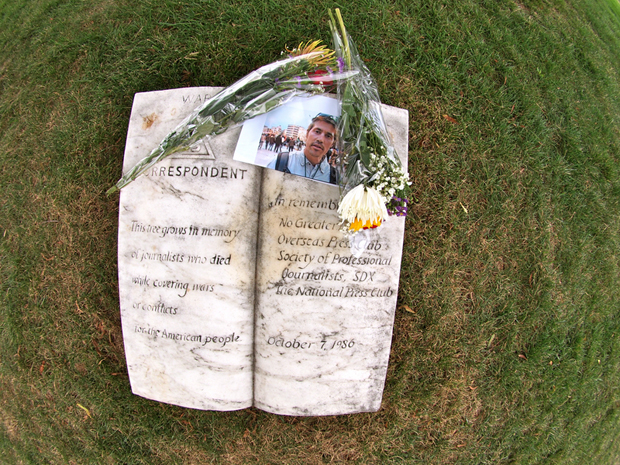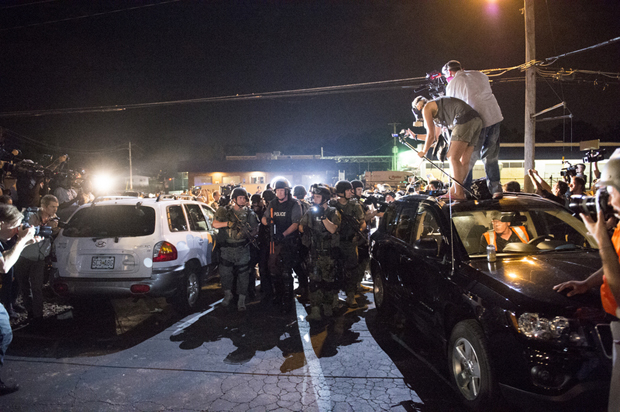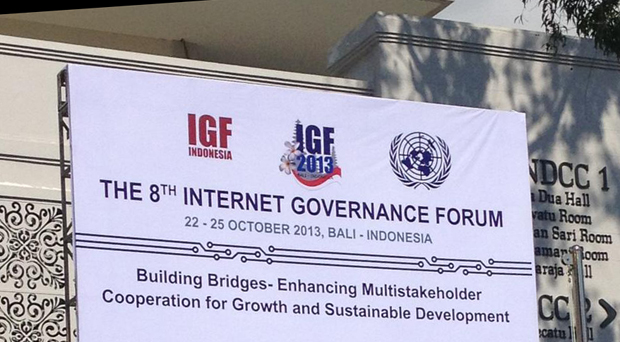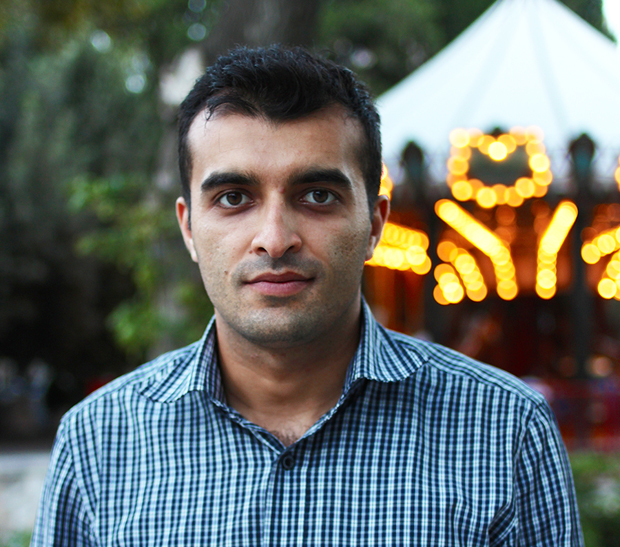21 Aug 2014 | Digital Freedom, Digital Freedom Statements, News and features, Uncategorized

Tributes to James Foley were placed at the War Correspondents Memorial in Arlington National Cemetery (Photo: Cynthia Rucker/Demotix)
On Thursday, after a video emerged of U.S. photojournalist James Foley being beheaded by Islamic State (ISIS) militants, the Metropolitan Police in London suggested that anyone who watched the video could be committing a crime. This takes us well beyond the realms of the #ISISmediablackout being urged by social media users, many of them journalists themselves, and does go to the heart of why censorship of such material is deeply problematic.
Questions of free speech and free expression are rarely clear-cut: the human rights laid out in the Universal Declaration frequently grate up against one another. Balancing the right to a privacy, for example, with the right to free expression and the public‚s right to know can be a high wire act; as is the balance between protecting children online from exposure to graphically violent or sexual content, and full-scale censorship.
And so deciding whether sharing, or even watching, a video of a criminal act, created as a deliberate piece of propaganda, rightly raises important questions. Are those disseminating this information playing into the hands of propagandists, so furthering their cause? Or are they raising awareness of their practices to a wider audience, leading to a better informed public? It is understandable that Twitter should want to respect the wishes of James Foley’s family by encouraging people not to share it. It is also understandable that Twitter and others would not want to be seen to be promoting propaganda that potentially glorifies terrorism and acts of horrific violence. It is also understandable that many social media users want to encourage an ISIS blackout, arguing that by sharing the Foley video, sharers simply give the group the oxygen of publicity and encourage more such acts.
But there is a difference between individuals exercising their right not to view or share the video, and companies such as Twitter — or indeed the police force — denying people the right to view it. If the Met police is right that just by watching the video individuals are committing a crime (and they have yet to show how or why this is), then David Cameron has broken the law. Barack Obama has also seen the video. As have I. As have a number of the journalists writing about the video in today’s papers: something they needed to do to be able to describe its full horror to others. We should not feed the flames of the propagandists by mindlessly sharing their videos, but nor should we make the mistake of assuming that global corporations, or indeed police forces, should decide who sees what. Because that simply plays into the hands of all those who want to end societies in which dissent and difference is tolerated; the kind of societies that celebrate and cherish the work of men like James Foley.
This article was posted on August 21, 2014 at indexoncensorship.org
21 Aug 2014 | Americas, News and features, United States

A number of journalists have been arrested while covering the protests in Ferguson, Missouri (Photo: Abe Van Dyke/Demotix)
As news spread of a video showing the murder of American journalist James Foley by the Islamic State (ISIS), journalists and Middle East watchers were unanimous on social media: do not watch the film. And for God’s sake do not post links to the film anywhere. Do not give the killers what they want.
The descriptions were brutal enough. They echoed back over a decade, to the murder of Daniel Pearl by Al Qaeda linked terrorists in Pakistan 2001.
There is a very specific message in the public execution of journalists. It’s a hallmark of extremism, in that it signifies that your movement is far beyond attempting to use the press to “get the message out”, to garner support. This is not about rational grievances the international community could address. This is not about convincing anyone who isn’t already open to your ideas. It’s about rejecting traditional ideas under which the press operates.
But this is partly possible because the likes of ISIS no longer need the attention of press to reach the world. Much has been made of the group’s social media presence. It’s genuinely impressive, and, importantly, clearly the work of people who have grown up with the web; people who are used to videos, Instagram, sharable content. They are, to use that dreaded phrase, “digital natives”. They understand the symbolic power of murdering a journalist, but they see themselves as the ones in charge of controlling the message.
Media workers are increasingly targeted, while the previous privileges they enjoyed fade away.
As I sat down to write this column, the number of journalists arrested while covering disturbances in Ferguson, Missouri stands at 17. According to the Freedom of the Press Foundation, this number includes reporters working for German and UK outfits, as well as domestic American media.
Journalists have apparently been threatened with mace. An Al Jazeera crew had guns pointed at them and their equipment dismantled. A correspondent for Vice had his press badge ripped off him by a policeman who told him it was meaningless (in slightly coarser language).
The Ferguson story is a catalogue of things gone wrong: racism, disenfranchisement, the proliferation of firearms, a militarised police force (a concept that goes far beyond mere weaponry; this is law enforcement as occupying force rather than as part of a balanced democracy). To single out the treatment of media workers may seem a little self serving, but there is good reason to do so.
We are used to telling ourselves by now that journalism is a manifestation of a human right — that of free expression. Smartphones, cheap recording equipment, and free access to social media and blogging platforms have revolutionised journalism; the means of production have fallen into the hands of the many.
This is a good thing. The more information we have on events, surely the better. But one question does arise: if we are all journalists now, what happens to the privileges journalists used to claim?
Official press identification in the UK states that the holder is recognised by police as a “bona fide newsgatherer”. As statements of status go, it seems a paltry thing. But it does imply that some exception must be made for the bearer. The recognised journalist, it is suggested, should be free to roam a scene unmolested. One can ask questions and reasonably expect an answer. One can wield a video or audio device and not have it confiscated. One can talk to whoever one wants, without fear of recrimination.
That, at least, is the theory. But in Britain, the US and elsewhere, the practice has been changing. Whether during periods of unrest or after, police have shown a disregard for the integrity of journalists’ work. The actions of police in Ferguson have merely been part of a pattern.
The question is whether we can maintain the idea of journalistic privilege when everyone is a potential journalist.
During the legal tussles over the case of David Miranda, the partner of former Guardian writer Glenn Greenwald, an attempt was made to identify persons engaged in journalistic activity, without necessarily being employed as journalists.
Miranda was detained and searched at Heathrow airport as he was believed to have been carrying files related to Edward Snowden’s NSA leaks, with a view to publication in the Guardian, though he is not actually a journalist himself.
The suggestion made by Miranda’s supporters (Index on Censorship included) is that the activity of journalism is what is recognised, rather than the journalist.
This may be applicable in circumstances such as a border search, but how would it apply in the heat of the moment in somewhere like Ferguson, or during the London riots, or any of the recent upheavals where citizen footage has proliferated. If someone starts recording a confrontation with the authorities, are they immediately engaged in journalistic activity? Or does journalism depend on what happens to your video, your pictures, your tweets?
When everyone is a journalist, is anyone?
This article was posted on August 21, 2014 at indexoncensorship.org
20 Aug 2014 | Digital Freedom, News and features, Turkey Statements

IGF 2013 was in Indonesia. This time Turkey plays host.
This year’s Internet Governance Forum (IGF) — a high-profile, United Nations-mandated annual conference on issues surrounding governance of the internet — is taking place in Istanbul, Turkey. But Yaman Akdeniz and Kerem Altiparmak, two renowned Turkish internet rights advocates, are boycotting it. Here they explain why.
Between May 2007 and July 2014 Turkey blocked access to approximately 48,000 websites subject to its controversial Internet Law No 5651. Although the law is ostensibly aimed to protect children from harmful content, from the very beginning it has been used to prevent adults’ access to information. In February amendments made to the legislation extended blocking provisions to include URL-based blocking of internet content. The same amendments compelled all internet service providers (ISPs) to be part of an association for access providers to centrally enforce blocking orders within four hours of receipt. It also introduced one-to-two-year data retention requirements for hosting companies and all ISPs. Furthermore, subject to new provisions, ISPs are required to take all necessary measures to block alternative access means such as proxy websites and other circumvention services including, possibly, VPN services. The amended version of the law also shields staff from the Presidency of Telecommunications and Communication (TIB) from prosecution if they commit crimes in their work for the telecoms authority.
In March access to both Twitter and YouTube was blocked arbitrarily and unlawfully by the TIB. With both blocking orders the government aimed to prevent the circulation of graft allegations ahead of local elections to be held on 30 March. During the blocking period, the authorities also ordered major ISPs to hijack Google and OpenDNS’s DNS servers, tampering with the DNS system to surveil communications, as well as to prevent users from circumventing blocking orders. Turkey’s constitutional court stated that the blocking of Twitter by TIB constituted a grave intervention on the freedom of expression of all Twitter users. Furthermore, in a 14-2 majority judgment, the court decided that the YouTube ban infringed on freedom of expression protected by the constitution.
However, despite these strong rulings, Twitter decided to implement its country withheld content policy for Turkey and started to block access to certain Turkish accounts and individual tweets. It was reported in June that Twitter complied with 44 out of 51 court decisions since they visited Ankara on 14 April, and the US-based social media platform continues to aid and assist Turkish authorities in censoring political content.
Facebook has also banned the pages of a number of alternative news sources, including Yüksekova Haber (Yuksekova News), Ötekilerin Postası (The Others’ Post), Yeni Özgür Politika (New Free Policy), Kürdi Müzik (Kurdish Music), and other groups related to Kurdish movements. The site has also been criticised for removing several pages related to the Peace and Democracy Party (BDP). Regardless of the above-mentioned constitutional court decisions, access to popular platforms such as Scribd, Last.fm, Metacafe, and Soundcloud is currently blocked from Turkey. Access to WordPress, DailyMotion, Vimeo and Google+ has in the past year been blocked temporarily by court or administrative orders. A number of alternative news websites that report on Kurdish issues, including Firat News, Azadiya Welat, Dengemed and Keditor, remain indefinitely blocked. In total it is estimated that 200 websites are banned indefinitely for their pro-Kurdish or left wing content.
Over the past year, many people have received suspended sentences and fines for their social media activity, usually on charges related to terrorism, blasphemy, or criticism of the state and its officials. In the crackdown following the Gezi Park protests of June 2013, dozens of people were detained over their social media posts. Criminal investigations and prosecutions were initiated subject to Articles 214 and 217 of the Turkish criminal code concerning incitement to commit a crime and disobey the law, as well as miscellaneous provisions of Law No 2911, on demonstrations and public meetings. In September 2013, pianist and composer Fazil Say was given a suspended sentence of 10 months and court supervision for insulting religious values in a series of tweets. Such criminal investigations and prosecutions have a chilling effect on all social media platform users.
In addition to widespread blocking of websites and content as well as criminal investigations and prosecutions to silence political speech, the Turkish authorities are also building surveillance infrastructure, which includes the deployment of deep packet inspection systems to monitor all forms of communications unlawfully.
Therefore, we have decided to boycott IGF 2014 hosted by Ministry of Transport, Maritime and Communications and coordinated by the Information and Technologies Authority. We also confirm that we will not be taking part in the IGF.
Yaman Akdeniz & Kerem Altiparmak
This edited version of the statement has been republished with permission from the authors. You can find the original and fully referenced statement here.
20 Aug 2014 | Azerbaijan, Azerbaijan Letters, Europe and Central Asia, News and features

Rasul Jafarov in September 2013 (Photo: Melody Patry)
In early August, Azerbaijani human rights activist Rasul Jafarov was charged with tax evasion, illegal entrepreneurship and power abuse and sentenced to three months of pre-trial detention, as part of a crackdown on the country’s human rights groups and dissident voices. This is his appeal to the international community.
Ladies and gentlemen, dear friends,
I would like to bring to your attention that the charges brought against me are completely unlawful and groundless. One might ask why? Because,
- I was registered as an individual entrepreneur with the tax authorities on 25 August 2008 and obtained a taxpayer identification number (TIN). From that time up until now, I fully and timely paid relevant taxes and social insurance contributions in accordance with the funds paid to me for my services under the projects in which I was involved. It can be easily verified by sending an inquiry to tax agencies.
- The Human Rights Club was founded in December 2010, and at the founding meeting I was elected the chairman of the organisation. The Human Rights Club has repeatedly applied to the ministry of justice for registration, but due to unjustified and unlawful denial of state registration, appeals were made to all relevant courts in Azerbaijan, and at present this case is pending before the European Court [of Human Rights]. The process of seeking registration and filing appeals continued from 2011 till 2013; since the legislation during this period did not prohibit the activity of unregistered NGOs, we, as the Human Rights Club, implemented a variety of projects during the years 2011-2013. Each of these projects was carried out under the grant agreements signed with donor organisations which I have voluntarily presented to the prosecutor general’s office. Also, at the time of signing of these agreements, the ministry of justice was informed through relevant letters sent to this state body. Moreover, the funds under each grant were transferred not in a secret or non-transparent manner, but through transfers to the bank accounts open and accessible for law enforcement and other relevant agencies, with the purpose of each transfer being indicated as “grant”. Since the Human Rights Club (HRC) was not registered, as the chairman of the HRC the transfers were made to my bank accounts. In this case, what kind of illegal entrepreneurship or abuse of office or tax evasion one can talk about?
You may wonder then why I was arrested. Let’s pay attention to the projects examined by the investigators and covered by the indictment:
- Human rights campaign related to Eurovision — Sing for Democracy; Art for Democracy campaign that uses different types of art to promote and protect human rights; increasing voter turnout on the eve of elections and so on. Along with being in the spotlight of the local and international community, all of these projects were targeted in libellous and insulting articles of the pro-government media which also included the ruling party’s official newspaper Yeni Azerbaijan.
- Azerbaijani government argues everywhere and at the highest level that there are no political prisoners in Azerbaijan. However I and my colleagues do not argue, but prove that there are political prisoners in Azerbaijan.
- During the session of the parliamentary assembly of the Council of Europe held in June 2014, i.e. shortly before my arrest, a roundtable was held on the gravity of the human rights situation in Azerbaijan. I was the person who was directly involved in determination of everything from the technical aspects to the content of the roundtable (together with Intigam Aliyev, Emin Huseynov and Rashid Hajili who are currently persecuted). I was also involved in organising the flash-mob held by our young friends on the day of Ilham Aliyev’s speech. And finally, in the past 2-3 years everyone was asking half-joking, half-serious, when I was going to be arrested. It happened, and now I’m looking forward to your support! Thank you everyone
Sincerely,
Rasul Jafarov
Baku Pre-Trial Detention Center (Kurdakhani settlement)
14 August 2014




